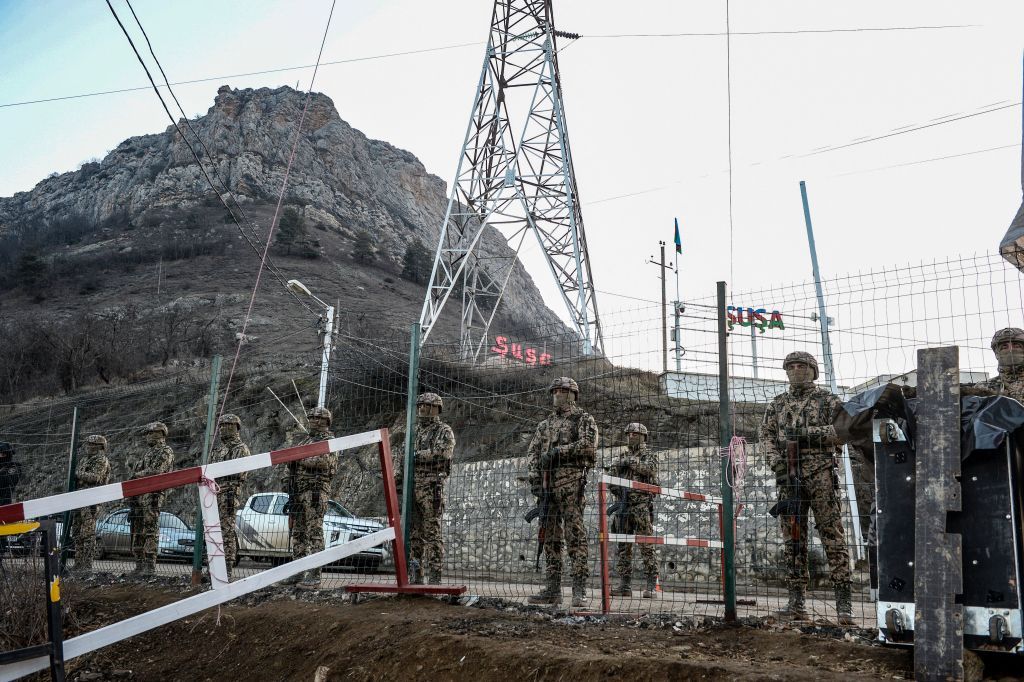Azerbaijan's president says country's 'sovereignty restored' after Karabakh offensive

Azerbaijan's President Ilham Aliyev said that his country "restored its sovereignty" following the Azerbaijani military operation in Nagorno-Karabakh, the Azerbaijan State News Agency (AZERTAC) reported on Sept. 20.
Aliyev claimed that much of the Armenian military stationed in Karabakh had been "completely destroyed" and its equipment disabled. Yerevan previously denied any military presence in the region.
The Azerbaijani president added that Baku's troops are disarming the remaining Armenian fighters and evicting them from the territory.
Following Azerbaijan's military offensive launched on Sept. 19 and reported advances into the territory held by the ethnic Armenian forces, authorities in the capital of Stepanakert (Khankendi in Azerbaijani) agreed to accept a ceasefire earlier on Sept. 20 mediated by Russia.
According to the terms of the proposal, any remaining Armenian troops must leave Azerbaijan territory and there must be a "dissolution and complete disarmament of the Armed Forces of Nagorno-Karabakh."
Further issues relating to the integration of the territory and the status of the predominantly ethnic Armenian population that live there will be discussed at upcoming talks on Sept. 20, in the Azerbaijani city of Yevlakh, RFE/RL's Armenian service reported.
President of the European Council Charles Michel called on Aliyev to ensure dignified treatment of Karabakh Armenians and provide them access to humanitarian assistance. The EU, as well as France and Germany, have previously denounced Baku's offensive.
Armenian Prime Minister Nikol Pashinyan said that Yerevan did not take part in drafting the ceasefire agreement between the self-proclaimed Nagorno-Karabakh and Azerbaijan.
The Armenian leader added that the document's references to the Armenian forces stationed in Karabakh are "absurd," reiterating that no Yerevan's troops are present in the area.
According to the Armenian government, Pashinyan held a phone call with Russian President Vladimir Putin after the offensive. The two leaders reportedly discussed the situation in Karabakh, the role of Russian "peacekeepers" in the ceasefire agreement, and other unspecified issues on the "bilateral agenda."
Azerbaijan's offensive sparked outrage among the Armenian population, as citizens launched protests in support of Karabakh, angered by the supposed inaction of the Armenian government. The local media reported that police have clashed with the protesters and launched mass arrests.
Pashinyan previously faced protests after Armenia's defeat by Azerbaijan in 2020.
Under international law, Nagorno-Karabakh is recognized as Azerbaijani territory, but has been under the de-facto control of Armenian separatists since 1991, who refer to it as Artsakh. Yerevan has supported the breakaway territory militarily, which regularly clashed with Azerbaijani forces in the following decades.
In 2020, Armenia and Azerbaijan fought a major war in which the latter's forces successfully reclaimed a large portion of the territory before a ceasefire was mediated by Moscow, which sent a "peacekeeping" force of several thousand Russian troops to the region.
In the following years, tensions did not subside, with Azerbaijan blockading the Lachin corridor, the only road connecting Armenia and Nagorno-Karabakh, leading to a humanitarian crisis widely condemned by UN member states and international organizations.















